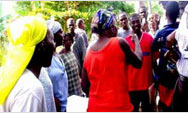You are here » Home » Telling Our Story
Case Study
70,000 learn about safer hygiene in post-earthquake life
Promoting Health and Hygiene

| |
Photo: USAID/Kaukab Jhumra Smith
|
|
A boy in the village of Upper Mittikot in northwestern Pakistan carries the 20-liter containers USAID provided to help families store drinking water safely.
“I learned how diseases spread and how to keep things clean. This has saved our lives,” says Yasmeen Shafiq, who now teaches other women in her village better hygiene habits.
|
Challenge
Even before the October 2005 earthquake, good hygiene practices were limited in rural Pakistan. After the quake damaged or destroyed a third of the homes the in North West Frontier Province’s affected districts, poor hygiene began posing a serious threat to people’s health and safety. “When we would tell people to cut their nails, they would ask: How? Our nail clipper is under rubble,” said Qurban Ali Shah, coordinator of a USAID-funded hygiene program. Everyday items lay buried out of reach.
Initiative
To reduce the risk of disease and increase awareness of the importance of good hygiene, USAID helped train over 730 men and women in safe hygiene practices and provided families with hygiene kits. The trainees learned about how diseases get transmitted and how hand-washing, safe food preparation, and proper waste disposal all help prevent disease. Upon returning home, each trainee taught 15 to 20 families what they had learned. After the families finished their own training, they received a hygiene kit with soap, towels, cotton cloth, combs, nail clippers, shampoo, a plastic mug, covered bucket, and 20-liter plastic containers to store drinking water safely.
Results
Some 3,000 families were trained and received hygiene kits, and the men and women who attended the workshop said the supplies were critical to improving hygiene in the post-earthquake environment. “If you have no home, how can you have hygiene?” queried Mundroo Bibi, a community trainer in Upper Mittikot village in northwest Pakistan’s Mansehra District. In addition, the education campaign increased hygiene awareness among the general public. “We weren’t aware of many of these things before the training,” said Gulzar Bibi, a trainer from Upper Mittikot. Yasmeen Shafiq, from the same village, concurred. “I used to eat vegetables without washing them,” she said. Now a trained hygiene activist, Yasmeen taught 30 women in her community to clean raw food and safely dispose of garbage.
Print-friendly version of this page (522kb - PDF)
Click here for high-res photo
Back to Top ^ | 

